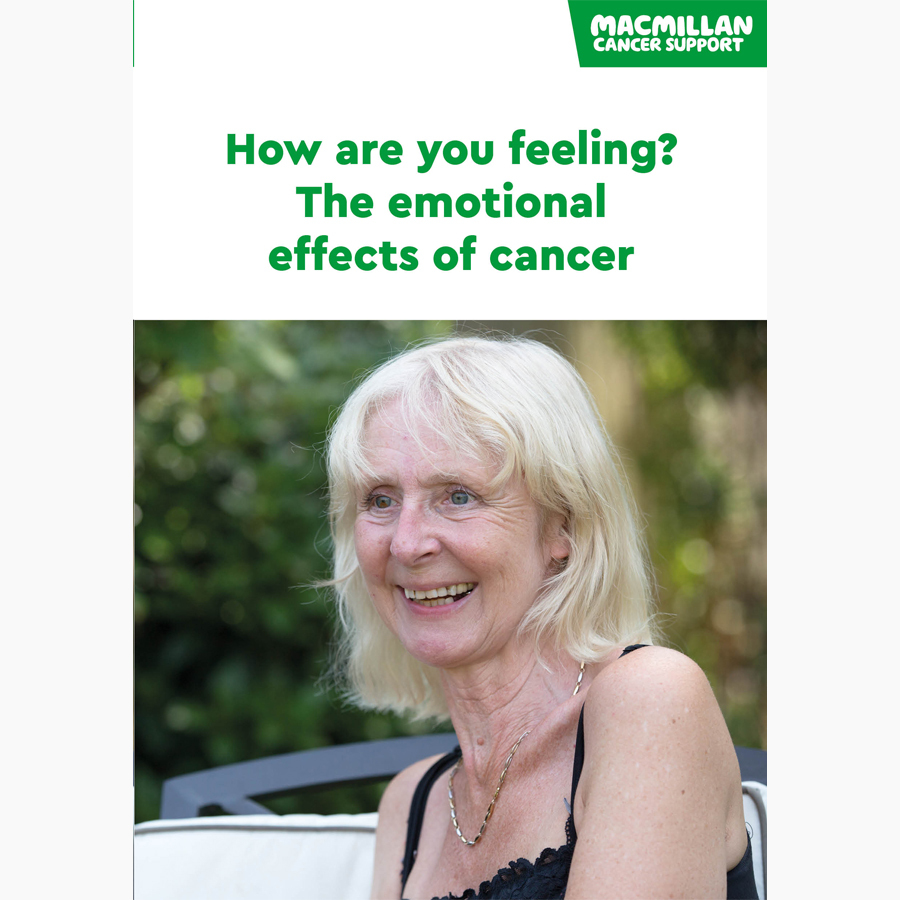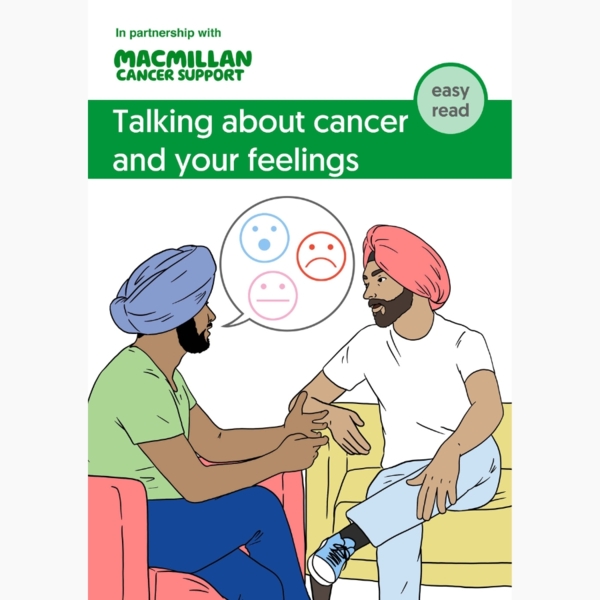Anxiety and cancer
Feeling anxious is a natural reaction when you have or have had cancer. But if it is affecting your daily life, you may need extra help and support.
Does cancer make you anxious?
Feeling anxious is a natural reaction when you have or have had cancer. It may come and go depending on what is happening at the time.
If anxiety is affecting your daily life, you may need extra help and support. You can talk to your GP, cancer doctor or specialist nurse.
Symptoms of anxiety include:
- racing thoughts
- finding it hard to concentrate
- feeling irritable, jumpy or restless
- sleep problems
- changes in appetite
- a constant feeling of dread or panic
- feeling like you are not connected to things happening to you or around you (dissociation).
If you are anxious, you may also notice physical symptoms such as:
- breathing quickly or heavily
- feeling faint, dizzy or shaky
- feeling hot and sweaty
- a dry mouth
- feeling very tired
- a tummy ache and feeling sick.
Other people telling you everything will be okay can make anxiety worse. You may feel that they are not listening, or they do not understand your worries.
Related pages
How to cope with anxiety and stress
Stress and anxiety are normal reactions to difficult life events. But living with stress and anxiety can be hard. There are things you can do to help manage your stress. You may want to try:
- talking to someone – this may be your friend, partner, family member, doctor, nurse, or a professional counsellor or psychologist
- focusing on your breathing – breathe in slowly and deeply through your nose and slowly out through your mouth
- practicing mindfulness – paid apps such as Headspace and Calm, and free apps such as Healthy Minds Program can help
- closing your eyes and listening to your surroundings, or to music
- moving, especially outdoors – even a short walk can help with anxiety
- carrying on with your hobbies and interests, if you can
- keeping a diary or journal – this can help you recognise things that trigger your anxiety
- complementary therapies such as yoga, meditation, massage or reflexology.
Getting support
Feeling stressed or anxious are normal emotions if you are dealing with cancer. If you feel your anxiety is getting worse, speak to:
- your GP
- your specialist nurse
- a psychologist or counsellor.
They can help you find ways of coping with it. Some people with anxiety also have depression. Speaking to your healthcare team is the best way to get the help you need.
You may find it helpful to contact Anxiety UK. You may also find that it helps to join a support group. We have more information on talking therapies.
Macmillan is also here to support you. If you would like to talk, you can do the following:
- Call the Macmillan Support Line for free on 0808 808 00 00.
- Chat to our specialists online.
- Visit our emotional support forum to talk with people who are dealing with the emotional impact of cancer, share your experience, and ask an expert your questions.
Related pages
Panic attacks
A panic attack is a sudden feeling of intense panic or fear. It causes mental and physical symptoms. They can feel very strong and unpleasant.
It is natural to feel panic or fear in a stressful or dangerous situation. But a panic attack can happen for no obvious reason. Symptoms can include:
- a pounding or racing heartbeat
- feeling very hot or cold
- sweating or shaking
- feeling sick (nausea) or needing the toilet
- feeling faint, dizzy or lightheaded
- feeling unable to breathe properly
- chest or stomach pains
- numbness, pins and needles, or ringing in your ears
- feeling like you are not connected to your body (dissociation).
How to cope with a panic attack
If you have a panic attack, there are things you can try:
- Stay where you are. If you are driving, stop the car.
- Do not fight it. Tell yourself it is a panic attack and that it will go soon.
- Focus on your breathing. It can help to concentrate on breathing slowly while counting to 5.
- March on the spot. Some people find that this helps control their breathing.
Practice grounding techniques. Focus on things you can see, hear, touch or taste. This can help you feel in control.
Panic attacks are frightening, but there are ways to help control them. Talking therapies can help you manage panic attacks. If you see a counsellor or psychologist, tell them you had a panic attack. They can try to work out how to help you. You can also talk to your healthcare team. They may be able to give you information about things that you can try.
There are also many self-help resources available. Your doctor or nurse may be able to tell you more about these.
Tell your family and friends you have had a panic attack in case it happens again. There are practical ways to manage them, such as breathing exercises and visualisation.
Booklets and resources
About our information
This information has been written, revised and edited by Macmillan Cancer Support’s Cancer Information Development team. It has been reviewed by expert medical and health professionals and people living with cancer.
-
References
Below is a sample of the sources used in our diagnosis and staging information. If you would like more information about the sources we use, please contact us at cancerinformationteam@macmillan.org.uk
Common mental health problems: identification and pathways to care. Clinical guideline [CG123]. May 2011. Available from: www.nice.org.uk/guidance/cg123 (accessed November 2022).Generalised anxiety disorder and panic disorder in adults: management. Clinical guideline [CG113]. January 2011. Last updated June 2020. Available from: www.nice.org.uk/guidance/cg113.
Depression in adults: treatment and management. NICE guideline [NG222]. June 2022. Available from: www.nice.org.uk/guidance/ng222 (accessed November 2022).
Date reviewed

Our cancer information meets the PIF TICK quality mark.
This means it is easy to use, up-to-date and based on the latest evidence. Learn more about how we produce our information.
The language we use
We want everyone affected by cancer to feel our information is written for them.
We want our information to be as clear as possible. To do this, we try to:
- use plain English
- explain medical words
- use short sentences
- use illustrations to explain text
- structure the information clearly
- make sure important points are clear.
We use gender-inclusive language and talk to our readers as ‘you’ so that everyone feels included. Where clinically necessary we use the terms ‘men’ and ‘women’ or ‘male’ and ‘female’. For example, we do so when talking about parts of the body or mentioning statistics or research about who is affected.
You can read more about how we produce our information here.







